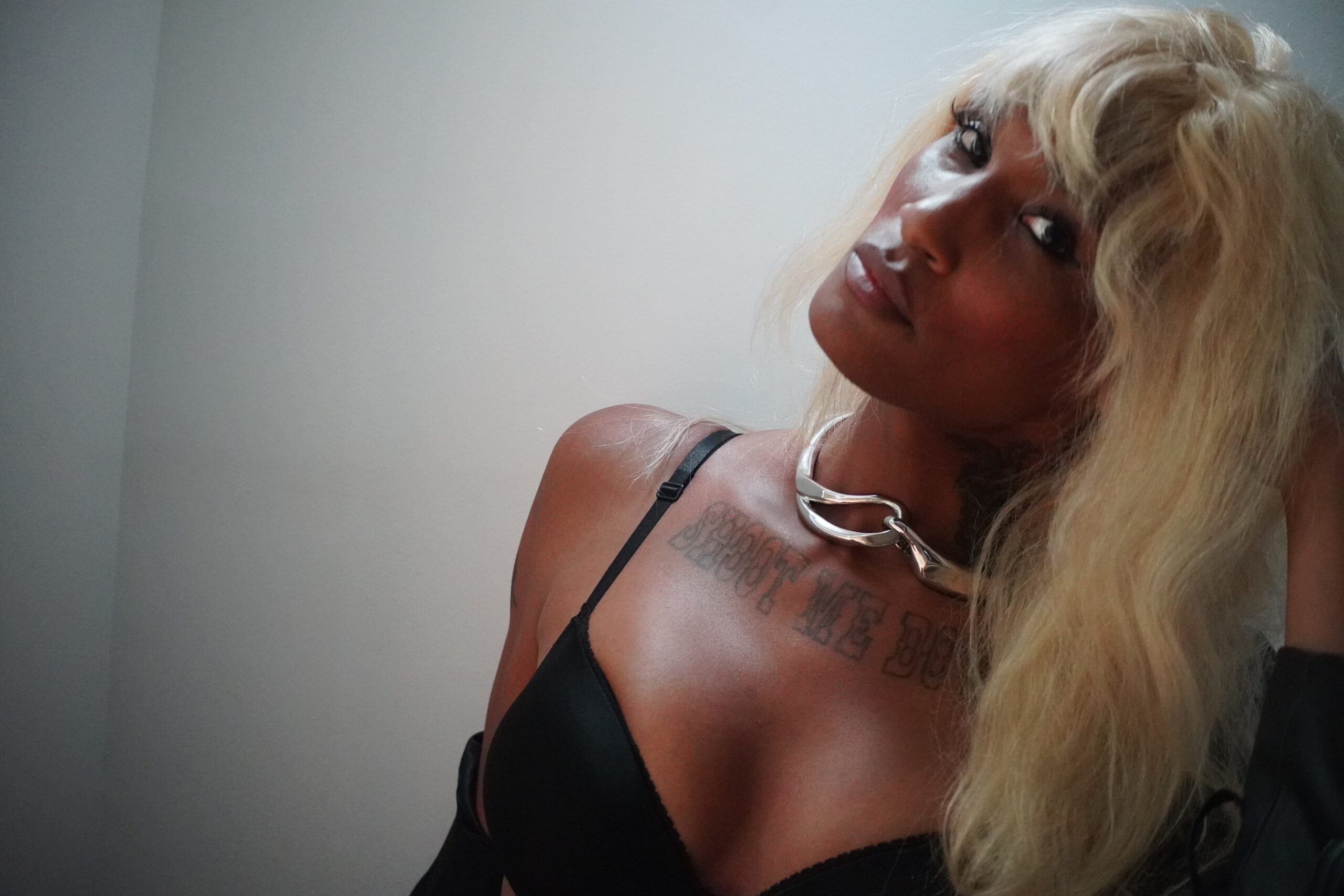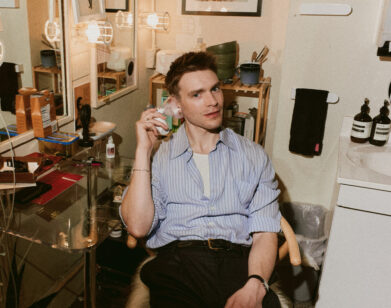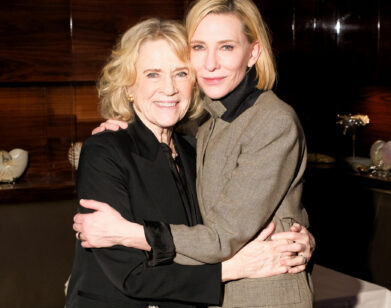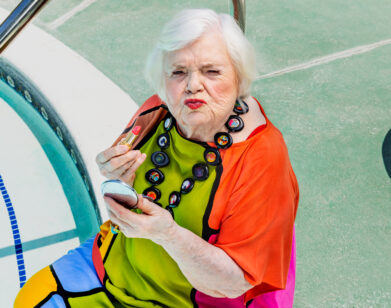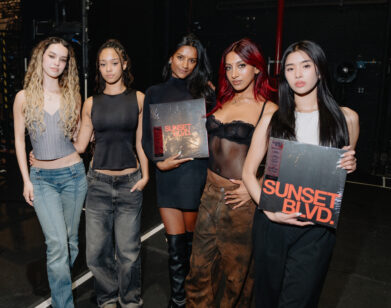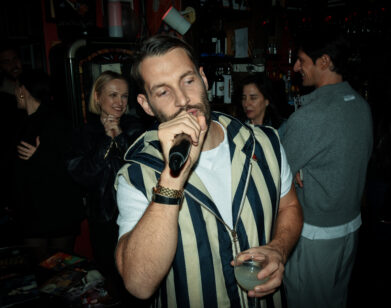film
Kokomo City Director D. Smith Hates the Word “Taboo”
D. Smith is ushering in a new queer film canon. The Grammy-nominated music producer made her directorial debut at Sundance earlier this year with Kokomo City, a real, raw narration of Black trans womanhood and sex work through the eyes of four compelling narrators from New York and Atlanta. After the film’s release last month, Smith joined rave reviewers Jeremy O. Harris and Mel Ottenberg to answer all of their burning questions on finding community, filming trade, and keeping it unfiltered.
———
JEREMY O. HARRIS: Hi.
D. SMITH: Hey.
MEL OTTENBERG: Congrats on such a good movie.
SMITH: Thank you so much. I am still processing.
HARRIS: I was on the jury this year at Sundance. Not on your jury, because there’s only one person on that jury, but on the day of deliberations, she came up to us because she made her decision very quickly. Every other jury had six people arguing about movies and she was like, “Mine was so easy. Jeremy, when you see it, you’re going to die.”
SMITH: Oh my god. Wow.
HARRIS: And she wasn’t wrong. It was so exciting. And to be able to rewatch it twice this week was even better. I saw so many more details of your filmmaking so I’m excited to talk to you.
OTTENBERG: I also watched it twice this week. It’s so good.
SMITH: Thank you. Did you get a chance to see it in theater at all?
HARRIS: I saw it in the theater. That’s one of the first things I want to ask you about. Sundance is an odd place to win an audience award because you’re winning it amongst people who are conservative Salt Lake City residents. And you were doing it at a time when the lives of people like us were actively being legislated against. What was it like to see them respond with such positivity to this?
SMITH: It was really gratifying. Really trippy, too. We’re in the mountains, and it was my first time, and there was, “I’m sorry, who is she?” There were so many things I had to learn in a matter of a week.
OTTENBERG: Did you go into the making of this documentary thinking that you were going to film it yourself?
SMITH: Yeah, absolutely. Before I got the camera, I had reached out to a few filmmakers and people with a little money, and they just weren’t feeling it. I’m also learning that I need to learn how to pitch. Because I’m like, “Yeah, poor trans women, naked and smoking weed in black and white. What do you think?” But also, it’s a cliché that everything happens for a reason, and it was meant for me to do this film. There was a sense of divine intervention for me to do this both to heal me and to really do it the way I would like to. I wanted a reset button for the transgender narrative. It’s just so intangible and scary and not realistic. I wanted something swaggy and sexy and cool and relatable and fresh. Who was going to do that?
HARRIS: You just have to do it yourself.
SMITH: And when I realized it was going to be me, I didn’t even look back. I wasn’t scared—I mean, I would do B-roll driving through Fort Lauderdale. I thought Opa-locka, where I’m originally from, was bad. But let me tell you, baby, you do not roll through the streets of miss Fort Lauderdale by yourself holding a camera, pointing it at groups of Black people. But that just goes to show how intrepid I was. I really just didn’t give a damn.
HARRIS: Yeah.
SMITH: First of all, you pull up on their street, and if they’ve never seen the car and they’ve lived there their whole life, they’re not going to take their eyes off of you. So intense. I really wanted to capture B-roll of groups of Black men, the trade or older Black people. It’s just a part of how I was raised, and there was something very nostalgic and comforting about revisiting that.
HARRIS: I have a very complex relationship to how Black people have been chronicled in cinema. Obviously, there are critiques to be had about something like Paris Is Burning. But as a lot of other Black critics have said, we weren’t supporting a lot of our own stories. And when white people did come in and pull out their camera, they were looking with an eagle eye at just one part of our community. What you did that’s so magnificent was that you have a holistic view of our lives. Yes, this is about Black trans women, but here’s a Black DL man. This is Black trade. I don’t know how they identify sexually, but they’re here. Here’s a mom, a dad, a cousin. What was it like for you to step into those realms with trade, and how the hell did you get some of them to talk so openly?
SMITH: I can get trade to do anything, baby. No, I’m joking.
OTTENBERG: Work.
SMITH: [Laughs] Stop.
HARRIS: You had these guys out here revealing themselves.
SMITH: Jokes aside, I know all of these guys, and I’ve never done anything with any of them. I know all of them because of music. I was a music producer, and a lot of guys gravitated to my music. Some of them I’ve worked with, some of them I haven’t. But I always kept in contact. So when I was telling them about Kokomo City, they was like, “Yo, we got to be in this, that sounds crazy.” I explained that I didn’t want it to be this villainizing, condescending, preachy film. I wanted it to feel Black and fun. If there was a way that Quentin Tarantino and Spike Lee could have done this together while being broke, what would that look like? I was very transparent with what my intentions were and how I didn’t have any special lighting, makeup, a production crew, it’s just me and my camera.
OTTENBERG: It looks really rich though. From your description, I can imagine someone not knowing that it’s going to be so lush. How do you get this lighting?
SMITH: I love natural lighting, so I used that a lot. I have one light that I bought from Best Buy for like 99 bucks, in case I needed to use it. But from a child, I’ve always had a fixation with composition. Even if I’m watching television and something feels heavier on one side, if a lamp feels imbalanced, I’ll want to adjust it. I know it’s kind of weird, but—
HARRIS: No, it’s not. You’re a filmmaker.
SMITH: Yeah, I’m a filmmaker. So I’ve always had a sense of composition and balance, of strength and weakness. And I didn’t have CAA at the time, I didn’t have my managers or Harris Doran who helped produce this. There were no rules because there was no money. I was kind of expecting that this film would ruffle feathers artistically. There are moments that I could have taken out that were probably improper cinematically, but it doesn’t matter. How could anything matter when you’re telling the truth? The most important thing was keeping my people in the film comfortable and inspired.
HARRIS: And one of the things that I think is so truthful about your film is that queer discourse was allowed to be on screen. Dominique says a lot of things that the minute she says it, you’re like, yes. And then you immediately allow someone like Daniella to complicate what she just said by maybe disagreeing. How did you find these subjects and allow them to meet the conflicts of the film and of their identities?
SMITH: I found the girls from searching Instagram first. I went through some of the celebrity trans women’s comments. I was looking for everyday trans girls that aren’t in the public eye to represent that untapped, untrained, unfiltered girl. So it took me a little time—a few weeks, really. One girl wasn’t into it and she said, “Maybe you should talk to this girl, Daniella Carter.” I’d never heard of Daniella at the time, but when I saw her Ted Talk, I was like, whoa.
HARRIS: Oh, sick. So there was a range of ways of finding everyone in the film.
OTTENBERG: I really related to her tangents and thinking on 6 million different planes at once. But what she said about Black people not accepting those who are different while the whites do was amazing.
SMITH: To be very honest with you, that is how we are as Black people. We used to be that way, the majority of us. There was a time, like Jeremy mentioned at the beginning, where we were embarrassed of our shortcomings. We can be the most unforgiving people on earth. We find a way to forgive other races before we forgive ourselves. And we persecute each other before we persecute someone else. That’s really what she was saying. And that old crab in a barrel thing definitely applies to Black people. I didn’t tell her to say that, but she spoke to something that really, really needed to be said in the film. And no one can deny it. It’s just the truth.
HARRIS: It is this complicated thing because we have Ben Shapiro on television railing against Barbie and transness rallying up all these white people on the other side. But we get online and people are still looking at who Blueface is or isn’t sleeping with, according to whatever was exposed that week on Instagram. And really taking down people of color inside of intra-people of color spaces like The Shade Room in the most disgustingly vile ways. It can feel so lonely because somewhere like Interview will be like, “Listen girly, we’ll put you in the magazine.” And I don’t know that they always feel the same safety or space inside of a Jet or an Ebony.
SMITH: Wow, that’s so deep. And what’s been most gratifying about people’s response to this film, especially straight people, is that a lot of them say, “This isn’t just about sex work.”
OTTENBERG: No, totally.
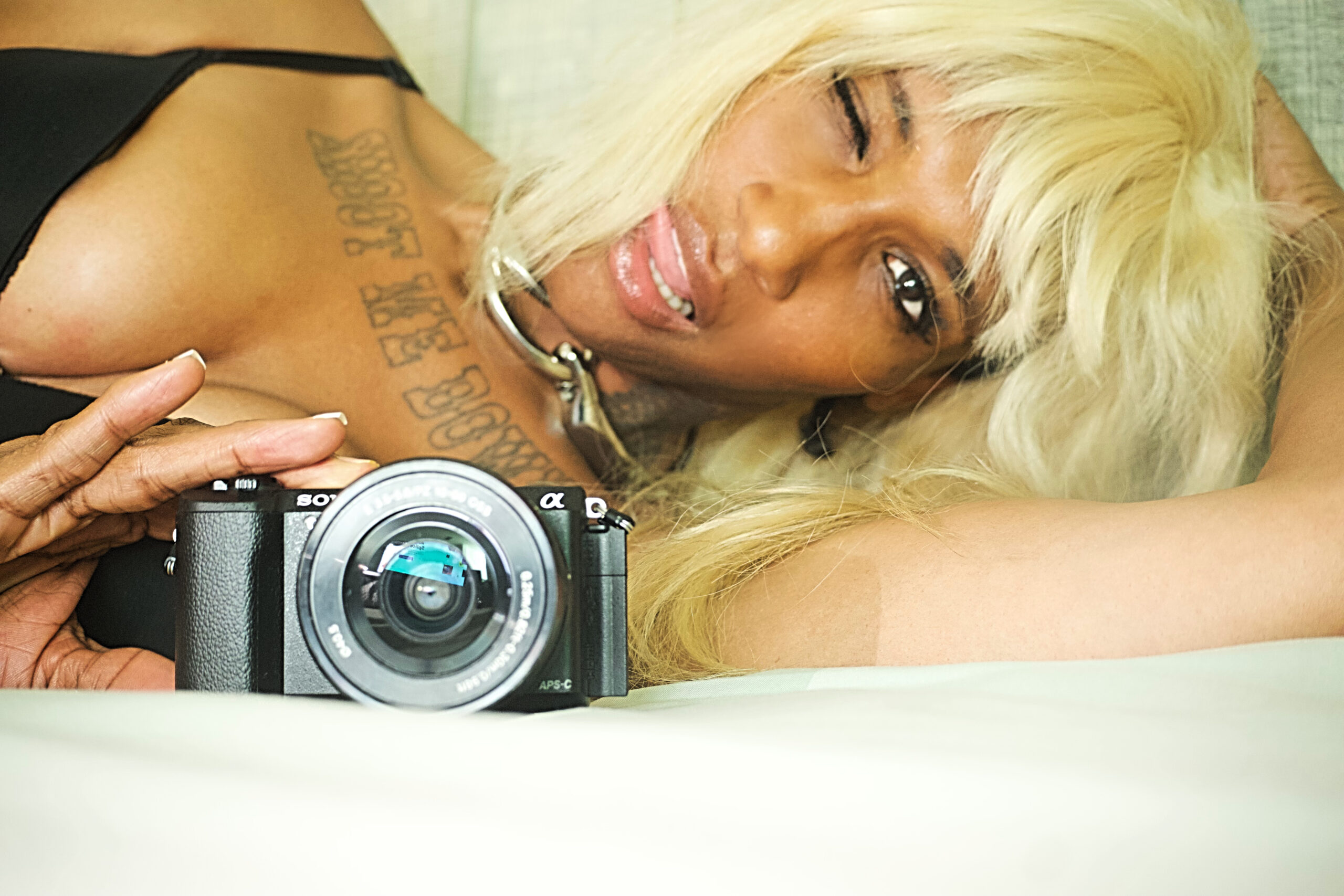
SMITH: It’s something so complex and so—I hate the word taboo. I love that people feel that there’s something else beyond the transgender community. There’s something that I wanted to do with Kokomo City that stems from our childhood, from our lack of coddling and lack of emotional encouragement growing up. All of these things come from when Koko was shot. That young man that killed her, that is sad. It is not just sad that Koko was killed. The sad thing is also that there’s a 17-year-old young man whose life is ruined. It’s a shame because Black men are so ashamed and confused that it takes extreme measures to feel balanced. They don’t know how to handle this emotional thing that’s happening because they’ve never felt safe enough to explain it. And here they are as an adult, and the only thing they can think of is, “Oh my god, if my friends find out, if my mom finds out.” So Kokomo City is not just about sex work, it’s about how we love and protect each other as Black people.
HARRIS: Yeah. It is so stunning how you articulated on the eve of Koko’s passing that her life will have such an impact after she’s left. So many of her moments are some of the most holistically uplifting and also humorous moments in the film. Oftentimes we write our own eulogies while we’re still alive, and you allowed her to author that so beautifully inside of this. So I just want to thank you deeply for that. But I also love this conversation you’re having about masculinity and femininity and the recognition of Black death. Daniella has a great monologue in the film, and I think a lot of people would be afraid to put something like that in the movie. There’s a complex metaphor in the tail end of the movie when she’s talking to her mother about coming out and how that might mean her losing another Black man in her life.
SMITH: Yeah. When I was filming her, we were in Brooklyn Bridge Park, and we were walking around flirting with guys and talking, and she was really exercising, for real. Sweating the whole time. I just filmed. And when she was done, I asked her, let’s walk to the end. And it got so real. Literally, I saw this forcefield around her. She is so brilliant. It’s so important that after this, she obtains a platform where she can continue to do this. Everything that I asked her, she took not even a second to think about. It just came out. And as I’m holding the camera, I’m wiping tears, I’m holding my mouth. I was in shock. And it’s just like Koko passing, knowing that if she wasn’t in this film, no one would’ve cared as much if she passed. That’s just a god honest truth. And not even so much care, but no one has time to mourn another person dying in this world that we’re living in. Everyone has so many battles that they don’t share. And if another trans girl was killed, that’s really what it would’ve been. Another trans girl murdered in Atlanta. It was absolutely divine and meant for her. She was born to be in this film.
OTTENBERG: When you’re editing, there’s a million different ways that it can go. Right? You got so many real stories out of everybody that you talked to in this film. So much of the magic must have happened in the edit also.
SMITH: Absolutely. I did this entire film on someone’s couch. But I also went into creating this film letting the girls know how I wanted this to look. I know that we all have our personal vices and ways of getting through life. And a lot of times for trans people, it is complaining and it is advocating, and I wanted that to come off. I want to show the softer, human, vulnerable, happy, calm side. Because sometimes we say the right things, but sometimes people get turned off by packaging, by wording. People get turned off by the word transgender. Sometimes people get turned off by the word lesbian or gay or the rainbow now. You have to really be approachable when you want to tell these stories. How do I get my cousin and my brother and his friends to want to watch this, even if it’s just them alone? So I couldn’t use everything that was being said. And that’s part of being a director. But I knew what I wanted. I didn’t waste time on filming too much stuff that I knew I didn’t need. And editing was my favorite part of doing this film by far. It was quiet.
HARRIS: But your musicality can’t go unknown. It’s such a part of good filmmaking. Through the charm of your edit, you normalize sex work in the way it is normalized for everyone because almost everyone is touching their genitals and getting off to a sex worker somewhere at some hour of the day.
SMITH: Right.
HARRIS: And you have someone who has that same tenor in their relationship to the work they do, while also subverting it with the spunky, jovial music. How conscious are you of your musical acumen as you’re editing?
SMITH: A lot of the music I had in my hard drive for years. I have so much music. And they all became something new once this film was created. Maybe it didn’t work for radio, but it’s great over Koko sitting on the couch telling a guy to get down on his knees. So all of these things just came alive after being cooped up in hard drives for years. This film from top to bottom is quintessential Smith. This is my soul. This is who I am. I wanted to make a documentary that I would want to watch, selfishly.
HARRIS: Well, have you shown your mom?
SMITH: My mom has seen bits and pieces, and the reason why is because I want to sit with her and watch it. I’ve not had the chance to do that. But I’m supposed to drive back with my boyfriend to South Georgia where she lives. My mom, she’s a queen. She’s so funny. She wants all my wigs, she wants all my shoes. She’s just such a sissy. She’s so crazy. And she can’t wait to see it, but she’s been very patient. I was like, “I have to watch it with you.”
OTTENBERG: All right, so now that your incredible first film is done, rave reviews across the board. What do you want to do next?
SMITH: I’m already in development with the next one.
HARRIS: Is it a feature or a doc?
SMITH: It’s a doc, but it’s so good. I have to do it. But my next one is a feature and it’s going to change the whole thing, I swear.
OTTENBERG: I believe you.
SMITH: I’ll put my life on that.
HARRIS: I love that.
SMITH: I’m just tremendously blessed right now. I’ve had so many major production companies reach out, and I’ve had some really, really great connections. But I have to prioritize what makes sense for me creatively. This next documentary is going to be so tremendous. It’s not LGBT, but it is definitely for the culture.
OTTENBERG: Fantastic.
HARRIS: It’s so good to meet you over this. I literally called everyone and I was like, “This is the only filmmaker I want to meet. Besides A.V. Rockwell.”
SMITH: Wow. That’s what’s up.
HARRIS: Thank you.
SMITH: I have to. I really wanted to start it with that. But you are so… I mean, I think it’s obvious that you know you were meant to do this and you’re meant to draw people in. That’s just what you were made to do, to just draw millions and millions of people in. It’s just written all over your face, your body, your aura. And I just want you to just stay motivated, stay encouraged, and stay focused. Because you got it. And I’m so proud of you. I’m so proud of you. And I hope we really get to work together, for sure.
OTTENBERG: Fantastic. Thank you for sharing so many great stories. It’s a movie that lasts forever.
SMITH: Thank you.

